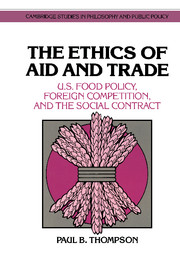Book contents
- Frontmatter
- Contents
- Acknowledgments
- Introduction: Of cabbages and kings
- 1 The food weapon and the strategic concept of food policy
- 2 The Bumpers Amendment
- 3 Does helping foreign industries violate a basic principle of government?
- 4 International agricultural assistance and the interests of U.S. agriculture
- 5 The trading state and the social contract
- 6 Humanitarianism, hunger, and moral theory
- 7 Morality and the myth of scarcity
- 8 The time has come, the walrus said, to speak of many things
- Notes
- References
- Index
6 - Humanitarianism, hunger, and moral theory
Published online by Cambridge University Press: 20 May 2010
- Frontmatter
- Contents
- Acknowledgments
- Introduction: Of cabbages and kings
- 1 The food weapon and the strategic concept of food policy
- 2 The Bumpers Amendment
- 3 Does helping foreign industries violate a basic principle of government?
- 4 International agricultural assistance and the interests of U.S. agriculture
- 5 The trading state and the social contract
- 6 Humanitarianism, hunger, and moral theory
- 7 Morality and the myth of scarcity
- 8 The time has come, the walrus said, to speak of many things
- Notes
- References
- Index
Summary
Philosophical analysis of hunger as a moral issue has roots in antiquity and figures in discussions of ethics and political philosophy throughout the roughly 3,000-year history of recorded philosophical thinking. The twentieth century, however, is a special case. When hunger and food policy became important political issues in the 1970s, the basis for contemplating hunger as a moral issue was reinvented, almost totally. The aim here is not to recover the past, but to examine the moral analysis of food policy that began to emerge about 20 years ago and to assess its relevance to the policy problems that are the primary topic of Chapters 1–5. Because the recent philosophical analysis of food policy arose in conjunction with a broad technical and political debate over the causes of world hunger and the prospects for eliminating hunger worldwide, the last 30 years of popular and philosophical writing on the moral issues in food policy can be referred to as the world hunger literature.
There is one general reason why most world hunger literature is inapplicable to the competitiveness issues raised by the Bumpers Amendment. Most authors that will be discussed here do not consider the political mandate for official aid philosophically important. The creation of organizations like the U.S. Agency for International Development (AID) is not taken up in the existing philosophical literature. The preceding chapters, however, focus almost exclusively on the philosophical problems that arise in attempting to specify and defend AID's mandate.
- Type
- Chapter
- Information
- The Ethics of Aid and TradeU.S. Food Policy, Foreign Competition, and the Social Contract, pp. 126 - 158Publisher: Cambridge University PressPrint publication year: 1992

